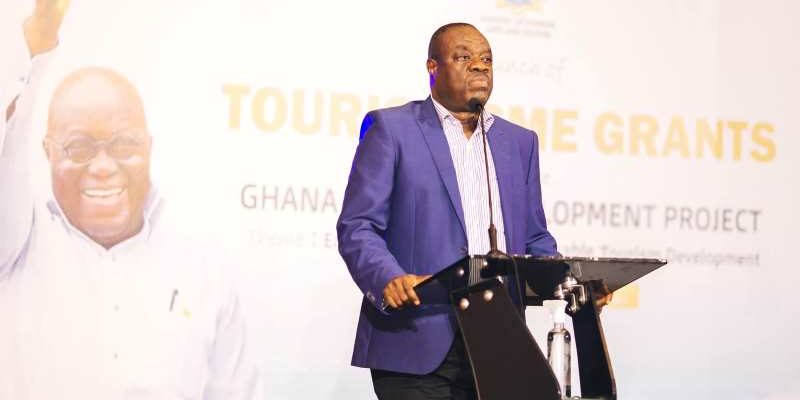In a recent address to the nation, Ghana’s Minister of Tourism made groundbreaking revelations that shed light on the pivotal role tourism has played in the country’s journey towards stable democracy. The minister’s insights not only highlighted the economic significance of the tourism sector but also underscored its profound impact on fostering social cohesion and political stability.
Dr. Ibrahim Mohammed Awal, the Minister of Tourism, Arts, and Culture, pointed out that historical context, electoral progress, civil society engagement, leadership and governance,economic development and social cohesion are some very noted testament the country has achieved that has significantly marketed Ghana around the globe
He revealed that Ghana’s path to stable democracy has been marked by a series of transitions and milestones. In 1992, the country adopted a new constitution, paving the way for multi-party democracy after years of military rule. This constitutional shift laid the foundation for transparent and accountable governance, creating a framework that promoted political pluralism and citizen participation.
Electoral progress is one of the cornerstones of Ghana’s stable democracy is its well-established electoral system. The country has consistently conducted free and fair elections, providing a platform for the peaceful transfer of power. The use of electronic voting machines and stringent monitoring mechanisms has enhanced the credibility of the electoral process, instilling confidence in both the electorate and political contestants.
The Minister also applauded the civil society for playing a crucial role in holding the government accountable and ensuring the protection of democratic values. Non-governmental organizations, advocacy groups, and the media have actively engaged in promoting transparency, advocating for human rights, and facilitating open discourse. This vibrant civil society has acted as a check and balance on political power, contributing to the country’s overall stability.
Furthermore the commitment of Ghana’s political leaders to democratic principles has been a driving force behind the nation’s stability. he said, past leaders, recognizing the importance of continuity, have respected the rule of law and willingly handed over power after electoral defeats. The peaceful transitions between different political parties have fostered a culture of political maturity and cooperation.
Economic development and social cohesion is Ghana’s emphasis on economic development and social cohesion has played a pivotal role in maintaining political stability. Policies aimed at poverty reduction, education, and healthcare have contributed to a more inclusive society, reducing the potential for social unrest. A growing middle class and a stable economic environment have further solidified the foundation of Ghana’s democratic institutions.
He added that despite its remarkable achievements, Ghana has not been without challenges on its path to stable democracy. Issues such as corruption, occasional electoral disputes, and regional disparities have tested the resilience of its democratic institutions. However, the ability of the government and civil society to address these challenges head-on, through legal and institutional reforms, demonstrates a commitment to continuous improvement. By learning from setbacks and adapting strategies, Ghana has shown that a dynamic and evolving democracy is better equipped to withstand the complexities of a changing society.
And regional influence and global recognition has not only had a transformative impact within its borders but has also positioned the country as a key player in regional and global politics. Through active participation in international organizations and peacekeeping missions, Ghana has earned recognition for its commitment to democratic governance and stability. The international community has lauded Ghana’s efforts, showcasing it as a role model for other nations aspiring to build strong democratic foundations. The success of Ghana’s stable democracy serves as a source of inspiration, reinforcing the idea that political stability is not only a domestic achievement but also a contribution to global peace and development.
Mr. Awal in his conclusion remark said, Ghana’s journey to a stable democracy has been a story of triumph over adversity. By addressing challenges, fostering transparency, and continually improving democratic institutions, Ghana has created a political environment that is both resilient and adaptable. The nation’s influence on the regional and global stage is a testament to the transformative power of stable democracy. As Ghana continues to set an example for others, its story becomes a beacon of hope for those nations seeking to build a future founded on the principles of democratic governance.


0 Comment